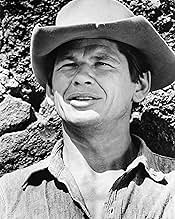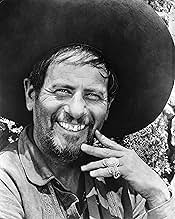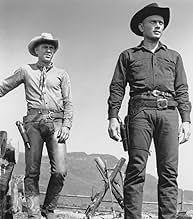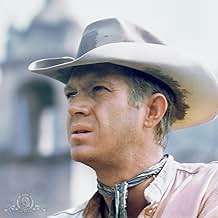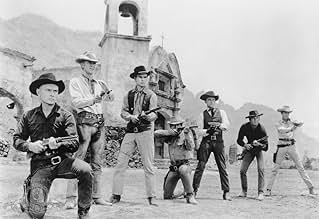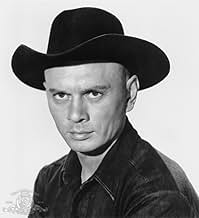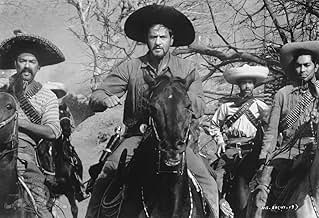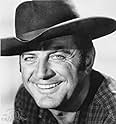Un pueblo campesino mexicano contrata a siete pistoleros para que protejan sus hogares.Un pueblo campesino mexicano contrata a siete pistoleros para que protejan sus hogares.Un pueblo campesino mexicano contrata a siete pistoleros para que protejan sus hogares.
- Dirección
- Guionistas
- Elenco
- Nominado a 1 premio Óscar
- 2 premios ganados y 6 nominaciones en total
Jorge Martínez de Hoyos
- Hilario
- (as Jorge Martinez de Hoyas)
Natividad Vacío
- Villager
- (as Natividad Vacio)
John A. Alonzo
- Miguel
- (as John Alonso)
Resumen
Reviewers say 'The Magnificent Seven' has a strong cast, including Yul Brynner and Steve McQueen, and an iconic score. But it's seen as less profound and more formulaic than 'Seven Samurai', which it's a remake of. The Western setting and Hollywood production style differentiate it from the more culturally specific and artistically driven original.
Opiniones destacadas
I've seen both the American and Japanese versions many times, and while everyone agrees about which one is better, the American version has some virtues: 1) Our heroes are selected by the farmers when they defend a dead Indian's right to be buried in the same place as white people; therefore they are seen as champions of social and racial equality by the farmers. 2) A magnificent villain played by Eli Wallach. 3) Charlie Bronson's relationship with the village boys. And some tremendous faults: 1) Combining the Young Student and Crazy Fool characters; some of the most poignant scenes in the Japanese version involved the interaction between these two. 2) Not filming the final battle in the rain. And of course many more of each. It's an interesting discussion. Both are great movies that shouldn't be missed. Remember that Kurosawa gave John Sturges a sword in appreciation after seeing his film.
Re-make are seldom as good as the original, but here Hollywood or rather John Sturges managed to capture some of the spirit of Kurosawa's 'Seven Samurai' which itself owes something to the 'Three Musketeers' and which Sturges duly acknowledged in the credits. Partly this is due to some inspired casting. With the exception of Yul Brynner, none of the actors was particularly well known at the time. Steve McQueen, Charles Bronson, James Coburn, Robert Vaughn, Eli Wallach and Horst Buchholz (an unlikely Mexican) all went on to successful acting careers. The format of this film was replicated in many later films.
The plot couldn't be simpler. Desperate Mexican villagers, bled white by local bandits, retain a group of almost equally desperate gunslingers from the other side of the Rio Grand to deal with the bandits. A lot of the fun arises early on as leader Cajun Chris seeks out half a dozen suitably deranged but deadly types for the job. Ostensibly they are doing it for the money but it becomes apparent early on that they are really on the team just for the hell of it. Once they are together things don't quite go to plan, but the camaraderie holds up, and their mission is accomplished, though at considerable cost.
Despite all the action it is a character-driven piece in some ways. Eli Wallach's Calvera the bandit leader is more than a cardboard cut-out villain and Yul Brynner's enigmatic Chris keeps us guessing. The villagers, despite their matching white smocks, are not all lily-white and each of the Seven has at least one interesting weakness.
A strong feature of the film is the music, penned by the ubiquitous Elmer Bernstein, and entirely appropriate, with a main theme which seems to be permanently welded into my brain.
'The Magnificent Seven' was made at a time when the appetite for westerns was going into decline. Whereas westerns were staple film and TV fare in the 50's, the sixties saw a sharp decline, as spy dramas and sex farces burgeoned. One interesting theory I've heard about this is that it's not so much that the audience tired of westerns, but that TV executives discovered that they were being watched by the people too poor to buy their sponsor's fine products. Anyway this film holds up very well after 45 years, a true classic and satisfying to watch.
The plot couldn't be simpler. Desperate Mexican villagers, bled white by local bandits, retain a group of almost equally desperate gunslingers from the other side of the Rio Grand to deal with the bandits. A lot of the fun arises early on as leader Cajun Chris seeks out half a dozen suitably deranged but deadly types for the job. Ostensibly they are doing it for the money but it becomes apparent early on that they are really on the team just for the hell of it. Once they are together things don't quite go to plan, but the camaraderie holds up, and their mission is accomplished, though at considerable cost.
Despite all the action it is a character-driven piece in some ways. Eli Wallach's Calvera the bandit leader is more than a cardboard cut-out villain and Yul Brynner's enigmatic Chris keeps us guessing. The villagers, despite their matching white smocks, are not all lily-white and each of the Seven has at least one interesting weakness.
A strong feature of the film is the music, penned by the ubiquitous Elmer Bernstein, and entirely appropriate, with a main theme which seems to be permanently welded into my brain.
'The Magnificent Seven' was made at a time when the appetite for westerns was going into decline. Whereas westerns were staple film and TV fare in the 50's, the sixties saw a sharp decline, as spy dramas and sex farces burgeoned. One interesting theory I've heard about this is that it's not so much that the audience tired of westerns, but that TV executives discovered that they were being watched by the people too poor to buy their sponsor's fine products. Anyway this film holds up very well after 45 years, a true classic and satisfying to watch.
Based somewhat faithfully on the Akira Kurosawa classic Shichinin no samurai, The Magnificent Seven could be mistaken for just another of the many Westerns that were turned out in Hollywood during this era. But there is a certain something that keeps The Magnificent Seven unique. Part of it is the concept borrowed from the earlier Japanese film, but some of it lies in the attitude of the seven mercenaries referred to in the title.
Much is made here of the difference between fighting for money, fighting for justice, or fighting for a future. While this version of Kurosawa's epic contains all the philosophical leanings of the original, it isn't nearly as long-winded or languid. The downside to this is that it isn't nearly as moody or powerful. In fact, one can easily see the difference between American and foreign cinema simply by comparing Shichinin no samurai with The Magnificent Seven. One is incredibly dark and downbeat most of the time. The other mostly has a score that is so major it wouldn't sound out of place in Seven Brides For Seven Brothers.
Differences in feeling aside, the ultimate question is whether this version of the story manages to entertain. The hardest challenge any film faces is keeping the audience amused while all the exposition is laid out. Here, the exposition is kept to a minimum while carefully inserted between some fast-paced, albeit very mild action sequences.
Sometimes, the dialogue ("We deal in lead, friend.") gets incredibly stilted. Sometimes, it seems incredibly wise. Well, since we have examples of films where it's all stilted, all the time, we can forgive this one. The film also includes several textbook examples of how to include a sudden plot element without seeming contrived. When we learn why Calvera's men just won't go away, it needs no setup simply because it is consistent with their behaviour throughout the rest of the film.
In the end, The Magnificent Seven comes off as an excellent remake of a masterpiece. There are better Westerns out there, and there are better action films, but there aren't many. I gave it a nine out of ten. Go in expecting to be entertained, but little more, and you cannot go wrong.
Much is made here of the difference between fighting for money, fighting for justice, or fighting for a future. While this version of Kurosawa's epic contains all the philosophical leanings of the original, it isn't nearly as long-winded or languid. The downside to this is that it isn't nearly as moody or powerful. In fact, one can easily see the difference between American and foreign cinema simply by comparing Shichinin no samurai with The Magnificent Seven. One is incredibly dark and downbeat most of the time. The other mostly has a score that is so major it wouldn't sound out of place in Seven Brides For Seven Brothers.
Differences in feeling aside, the ultimate question is whether this version of the story manages to entertain. The hardest challenge any film faces is keeping the audience amused while all the exposition is laid out. Here, the exposition is kept to a minimum while carefully inserted between some fast-paced, albeit very mild action sequences.
Sometimes, the dialogue ("We deal in lead, friend.") gets incredibly stilted. Sometimes, it seems incredibly wise. Well, since we have examples of films where it's all stilted, all the time, we can forgive this one. The film also includes several textbook examples of how to include a sudden plot element without seeming contrived. When we learn why Calvera's men just won't go away, it needs no setup simply because it is consistent with their behaviour throughout the rest of the film.
In the end, The Magnificent Seven comes off as an excellent remake of a masterpiece. There are better Westerns out there, and there are better action films, but there aren't many. I gave it a nine out of ten. Go in expecting to be entertained, but little more, and you cannot go wrong.
A wonderful classic beautifully scored and shot.
There are so many moody looks between characters, and little movements or idiosyncrasies that just make each of the gunmen seem so real. Apparently, there were big egos behind the camera that caused these acts of showmanship, but unlike most films where the egos clash, here they just build the characters up without harming them.
Yul Brynner and Steve McQueen are just wonderful, and James Coburn and Charles Bronson both put in equal performances. There's just nothing about this film that you can fault, the script is kept light when required and the stunning score lifts up and the acting is huge but never too much. This is a must see again and again.
There are so many moody looks between characters, and little movements or idiosyncrasies that just make each of the gunmen seem so real. Apparently, there were big egos behind the camera that caused these acts of showmanship, but unlike most films where the egos clash, here they just build the characters up without harming them.
Yul Brynner and Steve McQueen are just wonderful, and James Coburn and Charles Bronson both put in equal performances. There's just nothing about this film that you can fault, the script is kept light when required and the stunning score lifts up and the acting is huge but never too much. This is a must see again and again.
I first saw this film about 20 years ago as a teenager and I still find it as enjoyable now as I did then. It is the tale of seven gunfighters who are hired by a poor Mexican farming community to help drive off the bandits who periodically show up and steal the communities food and goods. Of the Magnificent Seven most of the screen time is given to Chris (Brynner), Vin (McQueen) and Chico (Bucholz). While no details are given about the individual pasts of the Magnificent Seven it is fairly clear what there pasts may have been.
1. Chris: A leader, perhaps a former soldier, who has encountered danger before and gained a degree of mastery over his emotions in dangerous situation.
2. Vin: A capable man with a gun, perhaps a one time cowboy. He seems to be comfortable working as a loner but clearly would like to one day settle down.
3. Chico: The youngest of the Seven and most inexperienced. He wants to shed his farming past and attempts through acts of bravado to persuade others and himself that he is a gunfighter at heart.
4. Bernardo (Bronson): A strong solitary man that in many ways resembles Chris although not displaying the desire to lead. In many ways he is the most interesting character. He has made quite a bit of money in the past even though he is now broke. The attention he gives to the local village children and the gift he gives a village girl hint at the idea that while he is good at gunfighting he knows that it is a good family life that is important.
5. Lee (Vaughn): The most difficult character to relate to. He appears to be a gunman who in the past was cocky, arrogant and self assured but now after experiencing life on the run now doubts himself. He wants to do the right thing but finds it difficult to step up to the plate when it's his turn.
6. Britt (Coburn): A loner who is unequaled in a gun or knife fight. A man whose motives remain his own.
7. Harry (Dexter): A good man to have in a fight but one who lets greed cloud his every decision. It would seem that Harry is one of those individuals who is always one step away from gaining riches but somehow never gains them.
The leader of the bandits is Calvera (Walsh) who is not an unlikeable fellow. He appears to believe that it is his job to steal so that he can support himself and his men. For him it is only a job, not unlike the farmers who work the land to provide for their families. He has what can almost be describes as a code of ethics for those who make their living with guns. This code of ethics is evident in the way he treats the Magnificent Seven towards the end of the film. However, given the films ending, this code does not seem to be shared by the Magnificent Seven
Lastly, while many people may view this film as a western action film I think there is quite a bit of underlying humanity and character depth woven into the story. It is these underlying characteristics that distinguish it from the average western action flick and have helped to make this film as popular as it is.
1. Chris: A leader, perhaps a former soldier, who has encountered danger before and gained a degree of mastery over his emotions in dangerous situation.
2. Vin: A capable man with a gun, perhaps a one time cowboy. He seems to be comfortable working as a loner but clearly would like to one day settle down.
3. Chico: The youngest of the Seven and most inexperienced. He wants to shed his farming past and attempts through acts of bravado to persuade others and himself that he is a gunfighter at heart.
4. Bernardo (Bronson): A strong solitary man that in many ways resembles Chris although not displaying the desire to lead. In many ways he is the most interesting character. He has made quite a bit of money in the past even though he is now broke. The attention he gives to the local village children and the gift he gives a village girl hint at the idea that while he is good at gunfighting he knows that it is a good family life that is important.
5. Lee (Vaughn): The most difficult character to relate to. He appears to be a gunman who in the past was cocky, arrogant and self assured but now after experiencing life on the run now doubts himself. He wants to do the right thing but finds it difficult to step up to the plate when it's his turn.
6. Britt (Coburn): A loner who is unequaled in a gun or knife fight. A man whose motives remain his own.
7. Harry (Dexter): A good man to have in a fight but one who lets greed cloud his every decision. It would seem that Harry is one of those individuals who is always one step away from gaining riches but somehow never gains them.
The leader of the bandits is Calvera (Walsh) who is not an unlikeable fellow. He appears to believe that it is his job to steal so that he can support himself and his men. For him it is only a job, not unlike the farmers who work the land to provide for their families. He has what can almost be describes as a code of ethics for those who make their living with guns. This code of ethics is evident in the way he treats the Magnificent Seven towards the end of the film. However, given the films ending, this code does not seem to be shared by the Magnificent Seven
Lastly, while many people may view this film as a western action film I think there is quite a bit of underlying humanity and character depth woven into the story. It is these underlying characteristics that distinguish it from the average western action flick and have helped to make this film as popular as it is.
¿Sabías que…?
- TriviaAlthough the film received mixed reviews, Akira Kurosawa was so impressed he sent John Sturges a ceremonial sword as a gift.
- ErroresSteve McQueen wears Levi's jeans with the famous red tab, which were not introduced until the 1930s.
- Citas
[Calvera has just captured the Seven]
Calvera: What I don't understand is why a man like you took the job in the first place, hmm? Why, huh?
Chris: I wonder myself.
Calvera: No, come on, come on, tell me why.
Vin: It's like a fellow I once knew in El Paso. One day, he just took all his clothes off and jumped in a mess of cactus. I asked him that same question, "Why?"
Calvera: And?
Vin: He said, "It seemed to be a good idea at the time."
- Créditos curiososAnd Introducing Horst Buchholz
- Versiones alternativasThe German theatrical release differs from the German VHS video in the scene where the magnificent seven have been taken by surprise and have to put down their weapons on the table. Chico is the last one and stands in enragement. In the theatrical version he then nevertheless unstraps his belt like the others. In the VHS video version Chris jumps at Chico just in that moment when he wants to pull the gun. Chris takes his gun and puts it on desk. Then Chico unstraps his belt.
- ConexionesFeatured in Precious Images (1986)
- Bandas sonorasThe Magnificent Seven Theme
Written by Elmer Bernstein
Selecciones populares
Inicia sesión para calificar y agrega a la lista de videos para obtener recomendaciones personalizadas
- How long is The Magnificent Seven?Con tecnología de Alexa
Detalles
- Fecha de lanzamiento
- País de origen
- Idiomas
- También se conoce como
- Siete hombres y un destino
- Locaciones de filmación
- Cuernavaca, Morelos, México(desert, sets)
- Productoras
- Ver más créditos de la compañía en IMDbPro
Taquilla
- Presupuesto
- USD 2,000,000 (estimado)
- Total a nivel mundial
- USD 416
- Tiempo de ejecución
- 2h 8min(128 min)
- Color
- Mezcla de sonido
- Relación de aspecto
- 2.35 : 1
Contribuir a esta página
Sugiere una edición o agrega el contenido que falta


